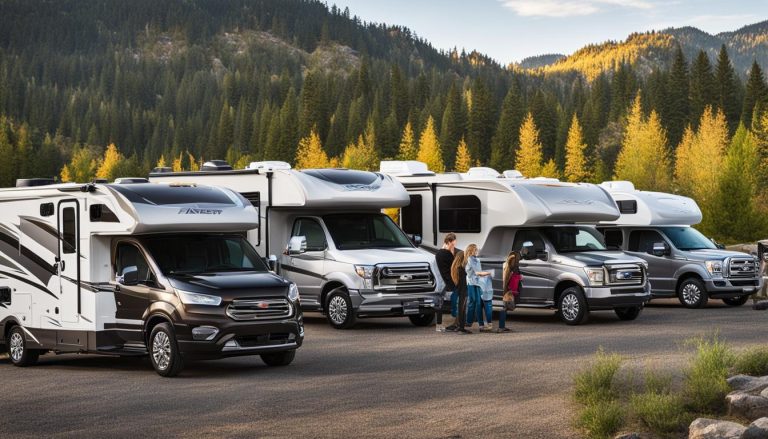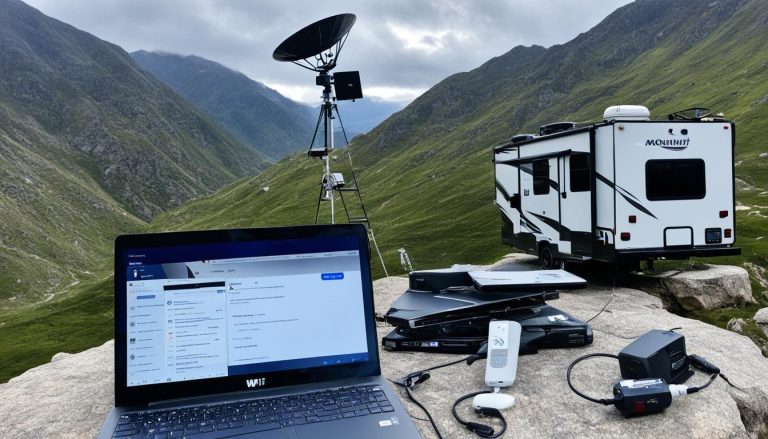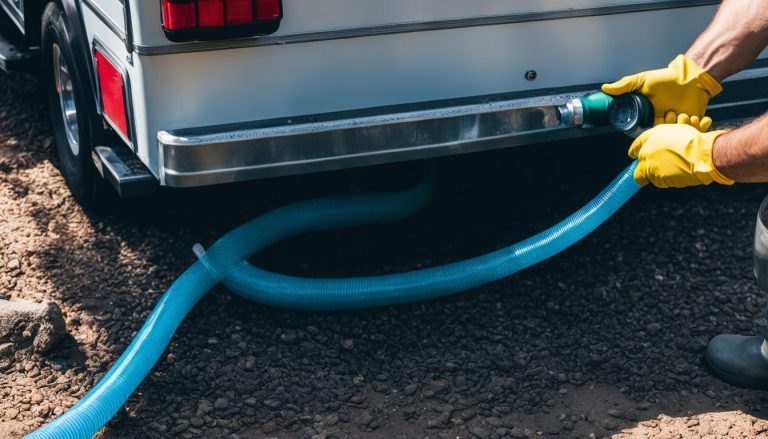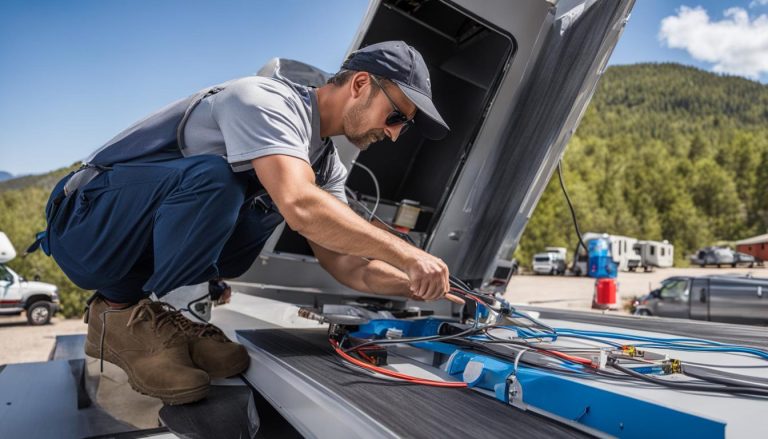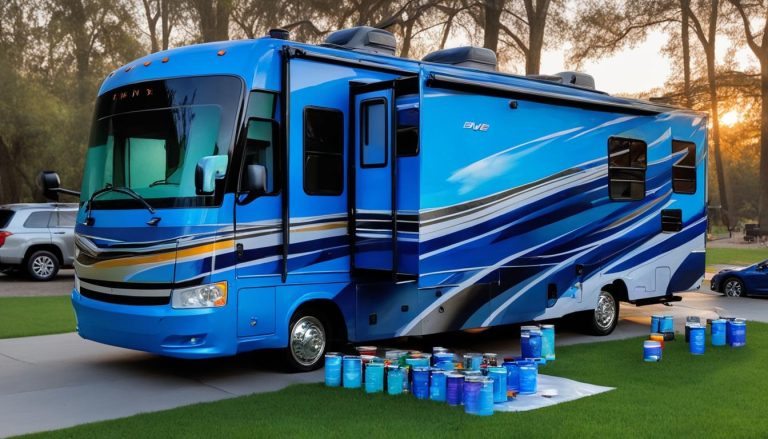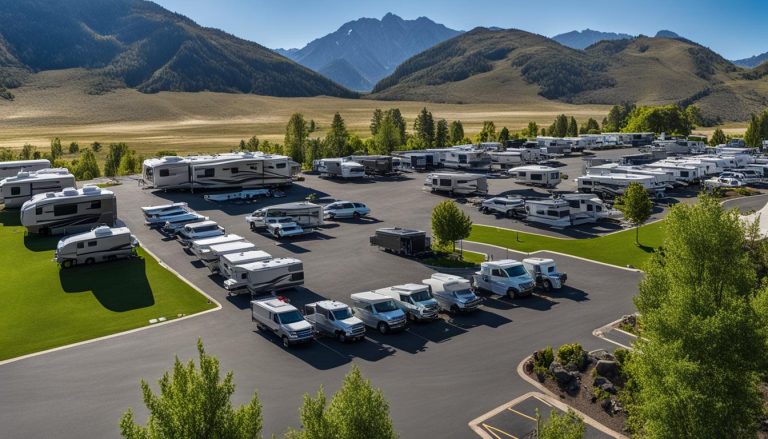Full-Time RV Living Guide: Essentials & Tips
gorvlifestyle.com and its partners may earn a commission if you purchase a product through one of our links
Considering full-time RV living? Living in an RV full time can be both exciting and challenging. But with the right preparation and mindset, it can lead to a rewarding and fulfilling lifestyle. In this guide, we will provide you with essential tips and advice to help you successfully transition to full-time RV living. From understanding the costs involved to finding the right RV park, managing utilities, and embracing the freedom of the road, this guide has you covered.
Key Takeaways:
- Full-time RV living requires preparation and a positive mindset.
- Understanding and managing costs is essential for financial planning.
- Community and social connections are important for a fulfilling RV lifestyle.
- Consider the benefits of stationary RV living, including cost savings and convenience.
- Regular maintenance is crucial for the longevity and functionality of your RV.
Full Time RV Living For Beginners Tips
When starting out with full-time RV living, it’s important to consider certain factors. One of the biggest questions is how much it costs to live in an RV and whether it’s cheaper than a traditional house. While the costs can vary depending on individual factors such as travel style and campground choices, there are some common expenses to consider.
Here is a breakdown of the key expenses when living in an RV full time:
| Expense | Description |
|---|---|
| Cost of an RV | The upfront cost of purchasing an RV can range from a few thousand dollars for a used model to several hundred thousand dollars for a brand new, luxury RV. |
| Park fees | RV parks charge a fee for staying at their facility. The cost can vary depending on the location and amenities offered by the park. |
| Utilities | Just like in a traditional home, you’ll need to pay for electricity, water, and possibly sewage hookups while living in an RV. |
| Maintenance | RVs require regular maintenance and occasional repairs, which can add up over time. This includes servicing the engine, generator, and other mechanical components. |
| Insurance | It’s important to have insurance coverage for your RV to protect against accidents, theft, and damage. |
| Roadside assistance | Having a roadside assistance plan can provide peace of mind and help with emergencies such as flat tires, dead batteries, and towing. |
| Fuel | Depending on how much you travel, fuel can be a significant expense. Consider the cost of gas or diesel and plan your trips accordingly. |
| Activities | From exploring national parks to visiting tourist attractions, budgeting for activities and entertainment is an important part of full-time RV living. |
| RV memberships | Joining RV clubs and memberships can provide access to discounted campsites, exclusive amenities, and a community of fellow RVers. |
| Groceries | Plan your meals and grocery shopping to fit your budget, considering the limited storage space and cooking facilities in an RV. |
| Eating out | While on the road, dining out is a common occurrence. Factor in the cost of eating at restaurants and cafes into your monthly expenses. |
| Internet access | Staying connected is crucial for many full-time RVers. Consider the cost of mobile data plans or campground Wi-Fi subscriptions. |
| Laundry | Account for the cost of doing laundry either at campgrounds or laundromats during your travels. |
| Subscription entertainment | If you enjoy streaming services or other subscription-based entertainment, include these costs in your budget. |
| Cell phone | Don’t forget to include your cell phone bill in your monthly expenses. |
| Propane | Propane is commonly used for heating, cooking, and powering appliances in RVs. Budget for propane refills as needed. |
| Water | Depending on the RV park, you may need to pay for water usage. |
| Sewer | RV parks often charge for sewer hookups and disposal services. |
| Mail forwarding services | If you’re a full-time traveler, you may need a mail forwarding service to handle your mail and packages. |
Understanding and budgeting for these costs will help you plan and manage your finances effectively while living in an RV full time.
Tips for Living in an RV Full-Time
Making the transition to full-time RV living requires adjustments and considerations. Here are some essential tips to help you navigate this lifestyle successfully.
- Embrace the Slower Pace: RV life is all about taking time to recharge and appreciate your surroundings. Enjoy the freedom and flexibility to slow down and savor the journey.
- Work-Life Balance: Find a job that suits the RV lifestyle or work remotely to maintain a flexible work-life balance. Embrace the opportunity to create your own schedule while exploring new destinations.
- Explore Different Destinations: Diversify your experiences by exploring various destinations. Plan ahead for some trips, and embrace spontaneity by going with the flow on others. This balance will make your RV journey more exciting and enjoyable.
- Build a Community: Combat potential loneliness on the road by building a community of fellow RVers. Attend RV meetups, join online forums or social media groups, and connect with like-minded individuals who share your passion for the RV lifestyle.
- Embrace Travel and Boondocking: Embrace the adventure and freedom that comes with RV living. Travel to new places, experience different cultures, and immerse yourself in nature. Be prepared for boondocking – camping without hookups – to expand your options and connect with the great outdoors.
- Optimize Your RV Experience: Carry cash and change for unexpected situations, download road trip apps for navigation and recommendations, listen to RV-related podcasts for inspiration, downsize your belongings to minimize clutter, and create an inviting outdoor hangout space to enjoy the fresh air.
Living in an RV full-time is a unique and rewarding experience. By following these tips, you’ll be well-equipped to embrace the full potential of the RV lifestyle and make the most out of your journey.
| Tips for Living in an RV Full-Time | Benefits |
|---|---|
| Embrace the slower pace. | Flexibility to slow down and enjoy the journey. |
| Find a job or work remotely. | Balance work and leisure on your own terms. |
| Explore different destinations. | Diversify experiences and make your journey exciting. |
| Build a community. | Combat loneliness and connect with like-minded individuals. |
| Embrace travel and boondocking. | Experience adventure and connect with nature. |
| Optimize your RV experience. | Enhance comfort and enjoyment. |
Benefits of Full-Time Stationary RV Living
Full-time stationary RV living offers numerous benefits, making it an appealing option for those seeking a unique and fulfilling lifestyle. Whether you’re looking for affordability, convenience, or a sense of community, stationary RV living has you covered.
One significant advantage of stationary RV living is the cost savings it offers. Compared to renting or buying a traditional home, living in an RV can be considerably cheaper. With lower monthly expenses, you can allocate your funds towards experiences and savings, providing you with financial flexibility and freedom.
Another benefit is the simplicity and convenience it brings to vacations. When you choose to live in an RV full time and travel to new destinations, you can take your home with you wherever you go. You don’t need to worry about packing or finding accommodations, as everything you need is already in your RV. This allows you to focus on exploring and enjoying your surroundings without the hassle of traditional vacation planning.
Living in an RV also encourages a minimalistic and fulfilling lifestyle. With limited space, you naturally end up prioritizing experiences over material possessions. This shift in mindset can lead to a more intentional and gratifying way of living, where you focus on what truly matters to you.
RV parks and campgrounds that cater to full-time RVers offer a range of amenities and activities, creating a vibrant and inclusive community. From social gatherings and events to shared facilities like swimming pools, fitness centers, and hiking trails, you’ll have plenty of opportunities to connect with fellow RV enthusiasts. This sense of community and the unique experiences it provides are invaluable aspects of full-time stationary RV living.
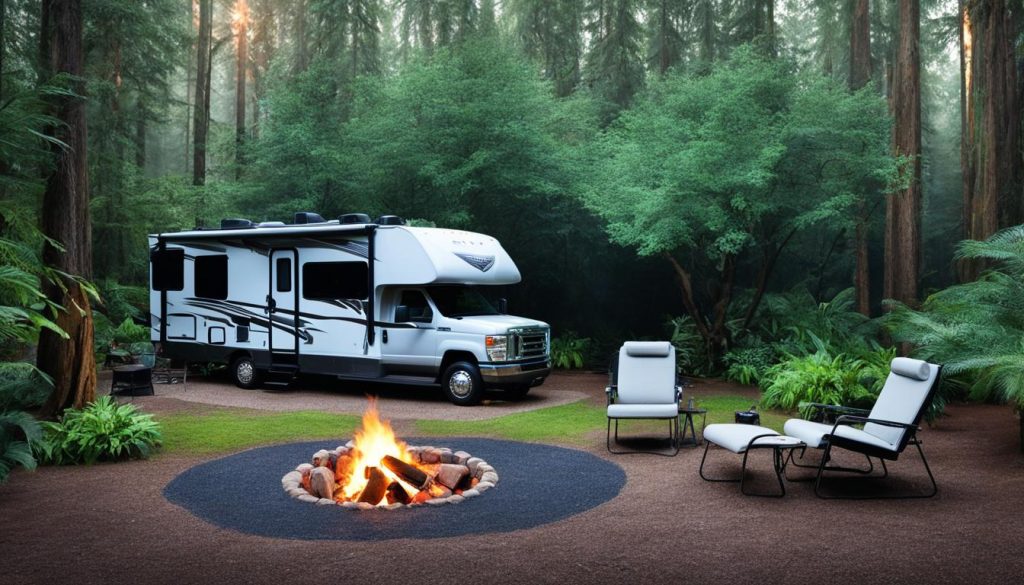
“Living in an RV allows you to declutter your life and focus on experiences rather than material possessions. It’s a liberating way to live.”
Essential Tips for Full-Time Stationary RV Living
If you choose to live full-time stationary in an RV, there are several essential tips to help you make the most of the experience.
- Choose the best RV park or campground that suits your needs and offers long-term stay discounts.
- Ensure a reliable Wi-Fi signal is available for remote work and staying connected to the world.
- Skirt your RV and use efficient storage solutions in colder climates to improve insulation and maximize space.
- Invest in RV kitchen tools and appliances to make cooking more efficient and enjoyable on the road.
- Set up a reliable mail service to receive packages and important documents while living in your RV.
- Keep up with monthly RV maintenance to ensure your home on wheels remains in excellent condition.
- Consider the size of your RV and choose a suitable space in the campground for optimal comfort.
- Create an outdoor hangout space with comfortable seating and a grill for enjoyable outdoor gatherings.
- Be open to the possibility of moving to a different location if necessary to explore new areas and experiences.
By following these tips, you can make your full-time stationary RV living experience more comfortable, enjoyable, and fulfilling.
RV Living Maintenance Tips
Keeping up with regular RV maintenance is crucial for maintaining the longevity and functionality of your RV. By following these maintenance tips, you can ensure that your RV is always in optimal condition, ready for travel whenever you need it.
1. Exercise and Regular Maintenance of the Generator and Engine
The generator and engine are essential components of your RV and require regular maintenance. Run the generator for at least two hours every month to keep it in good working condition. This will help prevent fuel from degrading and keep the engine lubricated. Additionally, schedule regular oil changes and filter replacements as recommended by the manufacturer to keep the engine running smoothly.
2. Regular Tire Maintenance
Tire maintenance is crucial for both safety and performance. Check your tires regularly for signs of wear and tear, such as cracks, bulges, or uneven tread wear. Maintain the proper tire pressure according to the manufacturer’s guidelines, as underinflated or overinflated tires can affect handling and fuel efficiency. Don’t forget to check the spare tire as well!
3. Inspections of Windows and Roof Seals
Regularly inspect the windows, roof seals, and seams of your RV to ensure they are intact and free from leaks. Look for any signs of water damage or mold inside the RV, as these can indicate a leak. Repair any damaged seals or caulking promptly to prevent further damage and maintain a watertight living space.
4. Repair Damages or Leaks
Accidents happen, and it’s important to address any damages or leaks promptly to prevent further issues. Whether it’s a small crack in the windshield, a damaged awning, or a leaky plumbing fixture, addressing these problems early can save you time and money in the long run. Be proactive in inspecting your RV for damages and repairs, and don’t hesitate to seek professional help if needed.
Remember, regular maintenance is key to preventing larger issues down the road.
Staying proactive with RV maintenance will ensure that your RV remains in excellent condition and ready for travel whenever you want to hit the road.
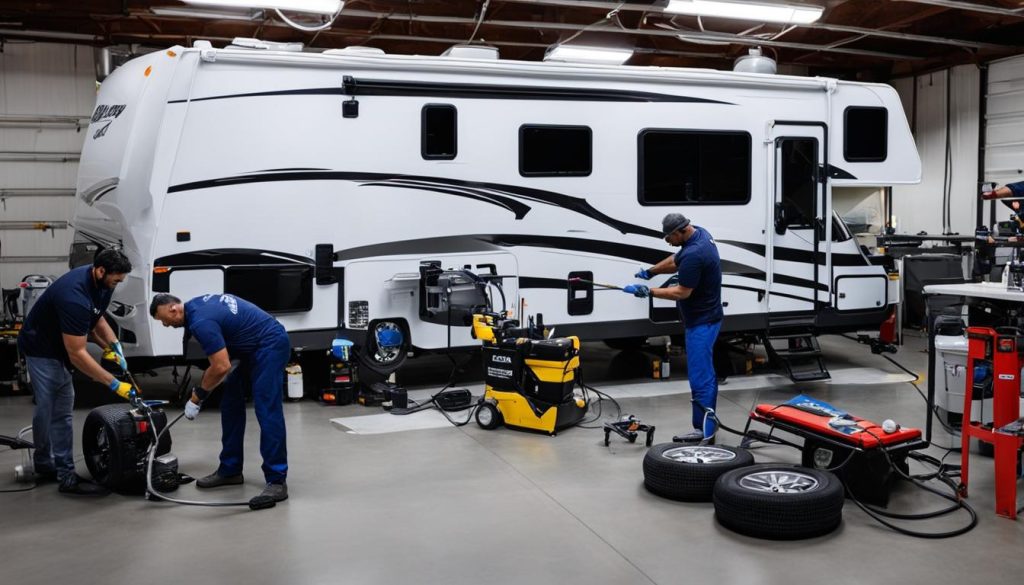
| RV Maintenance Tips | Frequency |
|---|---|
| Run the generator | At least 2 hours per month |
| Change oil and filters | As recommended by the manufacturer |
| Check tire pressure | Regularly |
| Inspect windows and roof seals | Regularly |
| Repair damages or leaks | As soon as they occur |
Regular maintenance is an essential part of owning an RV and ensures that you can enjoy your travels without any unexpected issues. By following these tips and staying on top of your RV maintenance, you can have peace of mind knowing that your RV is well taken care of.
Final Words on Full-Time Stationary RV Living
Transitioning to full-time stationary RV living is a unique and fulfilling lifestyle that offers numerous benefits. By following the tips and advice provided in this guide, you can successfully embark on your full-time RV journey and make the most out of your experiences. Whether you choose to embrace the freedom of full-time travel or establish a stationary home in an RV park, the RV lifestyle brings a sense of adventure and fulfillment.
Living in an RV full time allows you to explore new places, meet like-minded individuals, and create lasting memories along the way. It offers the flexibility to choose your own path and discover hidden gems while enjoying the comfort of your own home. Embracing the possibilities of RV living opens up a world of adventure, where the open road becomes your playground.
So, if you’re considering full-time stationary RV living, don’t hesitate to take the leap. With careful planning, budgeting, and embracing this unique lifestyle, you can unlock the freedom and flexibility that come with living in an RV. Whether you’re seeking a change of scenery, a simpler way of life, or the thrill of constantly exploring new destinations, the full-time RV lifestyle can offer it all. Embrace the excitement, discover new horizons, and enjoy the journey that awaits you in the world of full-time stationary RV living.
FAQ
How much does it cost to live in an RV full time?
The costs of living in an RV full time can vary depending on individual factors such as travel style and campground choices. However, some common expenses to consider include the cost of an RV, park fees, utilities, maintenance, insurance, gas or diesel, activities, groceries, eating out, internet access, and more. It’s important to understand and budget for these costs to effectively manage your finances while living in an RV full time.
What are some essential tips for transitioning to full-time RV living?
Some essential tips for transitioning to full-time RV living include taking time to recharge and appreciate your surroundings, finding a job that suits the RV lifestyle or working remotely, diversifying your experiences by exploring different destinations, building a community of fellow RVers, embracing a life defined by travel, being prepared for boondocking, carrying cash and change, downsizing your belongings, and creating an outdoor hangout space.
What are the benefits of full-time stationary RV living?
Full-time stationary RV living offers benefits such as affordability compared to renting or buying a traditional home, simplified vacations with all your necessities on hand, a more minimalistic lifestyle prioritizing experiences over belongings, and access to amenities and activities in RV parks and campgrounds.
What are some tips for making the most of full-time stationary RV living?
Some tips for making the most of full-time stationary RV living include choosing the best RV park or campground, ensuring reliable Wi-Fi for remote work and staying connected, improving insulation and maximizing space in colder climates, investing in efficient kitchen tools and appliances, setting up a reliable mail service, keeping up with monthly RV maintenance, creating an outdoor hangout space, and being open to moving if necessary.
What maintenance is required for living in an RV full time?
Regular RV maintenance is crucial for the longevity and functionality of your RV. This includes exercising and maintaining the generator and engine, regular oil changes, tire maintenance, inspections of windows and roof seals, and repairing any damages or leaks. Staying proactive with maintenance will ensure your RV is in optimal condition and ready for travel if needed.
Any final thoughts on full-time stationary RV living?
Full-time stationary RV living offers a unique and fulfilling lifestyle with numerous benefits. By following the tips and advice provided in this guide, you can successfully transition to full-time RV living and make the most out of your experiences. Whether you choose to travel full-time or establish a stationary home in an RV park, the freedom and flexibility of RV living can provide a sense of adventure and fulfillment. Embrace the possibilities and enjoy the journey!

